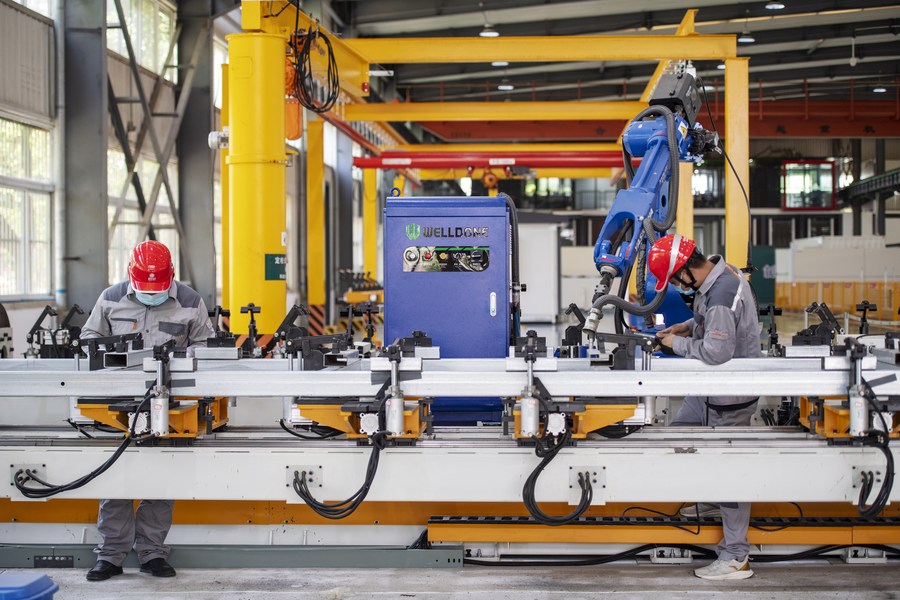
China's cabinet has urged the implementation of a large-scale policy package, which is expected to bring the country's economy back on track amid downward pressure and tackle difficulties encountered by market entities, according to experts.

Staff members work at the workshop of the Anhui Electric Power Transmission & Transformation Co., Ltd. in Hefei, east China's Anhui Province, May 13, 2022. (Xinhua/Liu Junxi)
China will implement 33 measures in six fields, mainly fiscal and related measures, to stabilize economic performance, according to a recent State Council Executive meeting.
"The raft of proposed policies is extensive, pertinent and prompt," said Wang Yifeng, an analyst at Everbright Securities. The mix coordinates fiscal, financial and industrial policies and aims to reduce COVID-induced impacts on the economy to a minimum.
FISCAL POLICIES
Confronting the current situation, the government has sought to take proactive fiscal policies that prioritize employment and economic stability, according to Zhang Yiqun, an expert from the Society of Public Finance of China.
The meeting elected to extend the country's policy of refunding outstanding and new value-added tax credits to more industries, which is expected to increase tax refunds by more than 140 billion yuan (21.03 billion U.S. dollars).
It also decided to defer premium payments of old-age, unemployment and workplace safety insurance until the end of the year for micro, small and medium-sized enterprises (MSMEs), self-employed households and companies in five hard-hit sectors: catering, retail, tourism, civil aviation, as well as highway, waterway and railway transportation. Deferred payments this year are expected to reach 320 billion yuan, covering the five sectors and other industries facing difficulties.
Zhang said the fiscal policies will free companies' cash tied up in premium payments to the greatest possible extent and release more capital for them.
Zhang also said he expected the premium payment deferral policy to extend to enterprises contributing to efforts to stabilize employment, foreign trade and prices, as well as those in the coal, power generation and new energy industries.
POLICY TOOLBOX
The meeting stressed that funds from this year's local government special bonds shall be basically utilized by the end of August, with their scope of support extended to new infrastructure and other projects.
The instruction urged the accelerated utilization of special bonds and sent a signal that new infrastructure is likely to replace traditional infrastructure as the investment focus in the future, while easing the scope of special bonds to boost investment returns, Zhang said.
The meeting also announced that the re-guarantee business of the national financing guaranty fund will be increased by more than 1 trillion yuan this year.
China's State Council approved the establishment of the national financing guaranty fund in April 2018 to relieve the financing troubles of the real economy and small businesses.
Zhang said the measures take full advantage of fiscal leveraging to bolster the financing capabilities of small businesses, and will help them tide over their current difficulties.
FINANCIAL INSTRUMENTS
The meeting decided to double the scale of the support facility for inclusive loans to micro and small businesses, as well as its share of the increase in the loan balance.
Banks will be supported in deferring, within this year, principal and interest repayments on loans made to MSMEs and self-employed households, truck loans, and home loans and consumer loans owed by individuals facing temporary difficulties.
Noting that some residents and firms had decreased incomes due to the COVID-19, and therefore are unable to repay their loans, chief analyst at CITIC Securities Ming Ming said the financial arrangements were appropriate, prompt and precise.
Zhou Maohua, an analyst at China Everbright Bank, said the expansion of the support facility for banks is mainly in place to cope with the complex economic environment.
The move steps up support for small and micro businesses, revives the vitality of market entities and expedites the economy's return to normal, Zhou said.